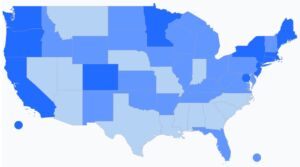Under laws like the Pregnant Workers Fairness Act, you may have a right to a workplace accommodation – a change to how, when, or where you do your job – to protect your health and to avoid risk and pain during pregnancy. Accommodations can help you to continue working safely and comfortably, or to get time off for your health.
Most employees have a right to receive changes to how, where, or when their job is done to protect their health and wellbeing when impacted by pregnancy, childbirth, and related conditions. This includes changes you need for:
- Pregnancy symptoms and pregnancy complications
- Infertility
- Miscarriage, pregnancy loss, and abortion
- Childbirth and recovery
- Postpartum depression
- Lactation (breastfeeding/chestfeeding)
To learn how to ask the changes you need, visit our know-your-rights guide “Talking to Your Boss About Your Bump,” created by the Center for WorkLife Law and A Better Balance.
Many people need changes at work so they can work safely and protect their health and wellbeing during pregnancy or postpartum. These changes are called “accommodations.” The Pregnant Workers Fairness Act requires employers to provide “reasonable accommodations” when they know an employee needs them because of pregnancy and related conditions.
Examples of common accommodations for pregnancy and related conditions include:
- Extra breaks for rest, snacks, water, and restroom use
- Uniform changes
- Changes to job duties or changes needed to avoid bending, lifting, climbing, walking, and/or standing (like permission to sit on a chair)
- Permission to eat or drink water more often while at work
- Schedule changes
- Working virtually
- Avoiding toxic chemicals or other hazards
- Time off for pregnancy-related doctor appointments
- Leave for pregnancy complications or childbirth recovery
- Lactation break time, space, and other needs (to learn more about breastfeeding, chestfeeding, and pumping at work, see our guides in English or Spanish/Español)
- Any other solution you and your employer can find that meets your health needs without being very difficult or expensive for your employer. Our Guide to Pregnancy Accommodations has ideas that may work for you
Learn more about your rights and how to request the accommodations you need here:
Need Help?

Need bathroom breaks, telework, leave, or other changes due to pregnancy? Have questions about your rights?
Contact the Center for WorkLife Law’s free legal hotline to talk to a lawyer.
- Email [email protected]
- Call (415) 703-8276
State Laws Protecting Pregnant Employees
Some states provide additional protections for pregnant employees, beyond national laws. Use our interactive map to learn more:
Check out our related pages:
- Abortion and Pregnancy Loss
- Lactation
- Fertility Treatment
- Mental Health
- Collective Bargaining Language
Contact the Center for WorkLife Law’s free legal hotline to speak to a lawyer about your rights:
Email [email protected] or call (415) 703-8276.







